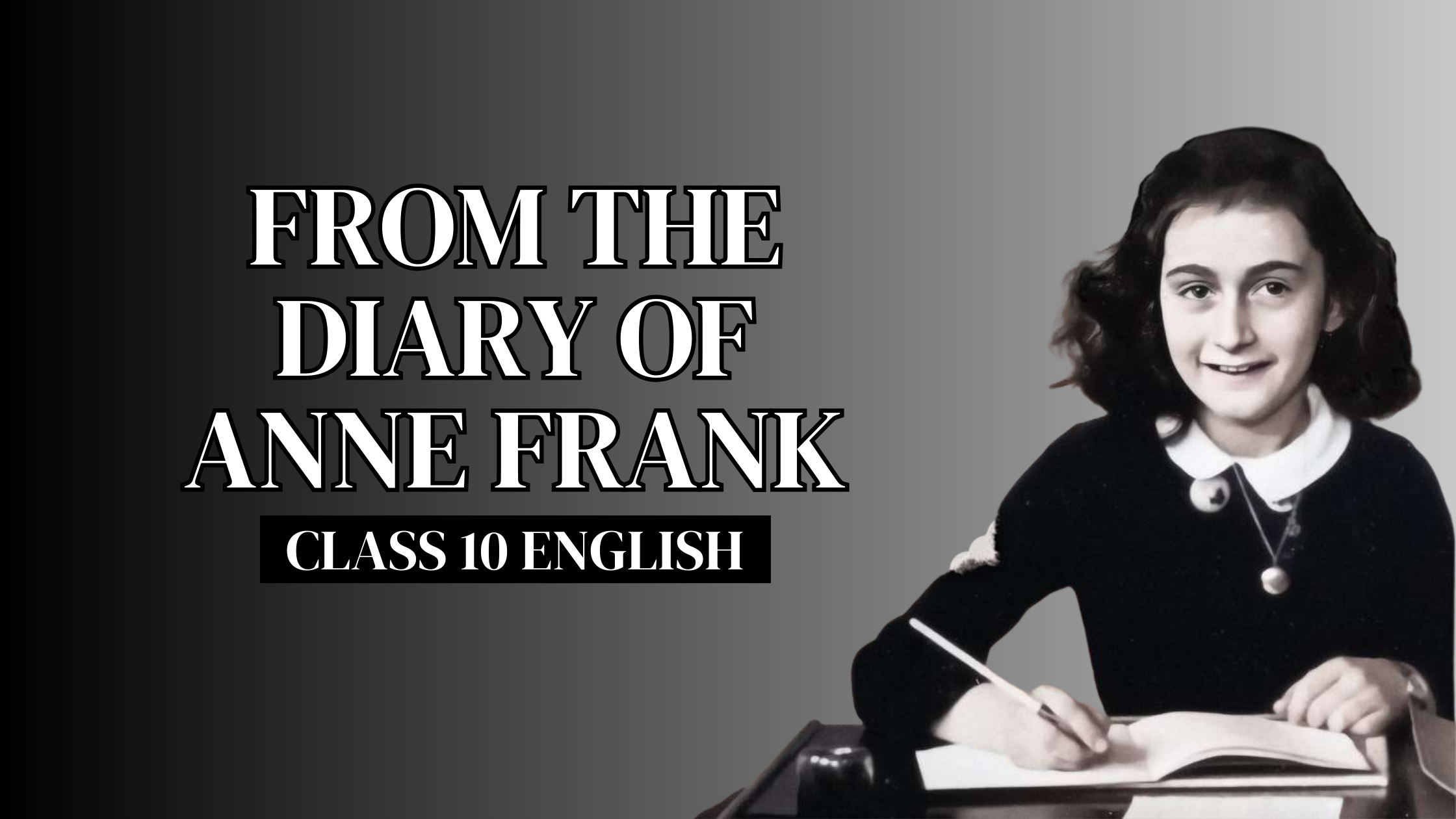We have provided the short summary of class 10th chapter From the diary of Anne Frank, along with the questions and answers and extract-based questions. Students will be able to attempt the questions after getting the synopsis from this article. From the diary of Anne Frank is an extract from the book called The Diary Of A Young Girl, written by Anne Frank describing some weird and humorous feelings of her life.

From The Diary Of Anne Frank Summary
Anne, the protagonist of this account, writes her feelings and strange experiences in her diary. Because she has not written anything earlier and the other reason is that no one would be interested in reading something written by someone else.
Anne felt that paper has more patience than people. She planned to stay in and thought for a while. No one is interested in reading something written by an immature girl. Her father has gifted her a diary on her 13th birthday. She has given her the name ‘kitty’. Anne feels that people have very low patience and she also has some merry-making with her friends.

On June 20, 1942, she mentions to Kitty that she was feeling very low and her class was worried about the results. The protagonist says that she was worried and skeptical about mathematics. She and her friend G were trying to stop the classmates from making noise. According to her, most of the students who have not participated in any activities should not be declared passed.
Anne Frank realizes that her maths teacher is constantly irritated by her talkative nature. As she was very talkative, he gave her extra homework as punishment. The first punishment he gave was to write an essay on Chatterbox. Anne writes the essay with some supporting grounds to talk about. And she was allowed to talk in the class.
After observing her for some days, her maths professor again gave her a topic to write, quack, quack. Now poor Anne runs out of thought writing similar topics. She decides to write the poem instead of the essay. The professor read that poem in front of all the students and she was allowed to talk as much as she could.
In her diary, she also wrote some personal details about her family. As her father married her mom at the age of 36. She was born on 12th June. Then their father went to Holland. Anne skipped diary writing when her grandma was ill. She has described that she was very attached to her grandma.
Ncert Solutions: From The Diary Of Anne Frank
Q1. What makes writing in a diary a strange experience?
First, Anne Frank had not written anything like this before and secondly, she thought that nobody was going to read or would be interested in her diary.
Q2. Why did Anne think she could confide more in her diary than in people?
Though Anne would love to confide in her close friends, she didn’t have one. The friends that she had liked to have fun and enjoy the good times. They were not the kind whom she could confide in. She also believed that paper has more patience than people, so she decided to write and confide in a diary.
Q3. What tells you that Anne loved her grandmother?
Anne’s statement, that no one could understand her intensity of love for her grandma indicates that she loved her grandmother. In addition, her touching gesture of lighting a candle for grandmother during Anne’s birthday is also a poignant reminder of her love for grandma.
Q4. How did Anne justify her being a chatterbox in her essay?
She gave two arguments to justify her ‘Chatterbox.’ First, chatting is a student’s trait, and second that inherited traits are not curated.

Q5. What made Mr. Kessing allow Anne to talk in class?
Anne was able to justify her talkative nature every time she was punished by Mr. Keesing. On three occasions, as punishment, he gave her topics to write essays on. However, on each occasion, he was impressed by the manner in which she presented her arguments. Finally, Mr. Keesing accepted the fact that Anne would always be that way. Hence, she was allowed to talk in class.
Q6. Why does Anne need to give a brief sketch of her family? Does she treat ‘kitty’ as an insider or an outsider?
Anne Frank claims that paper has more patience than people. She is usually depressed and all alone. She claims to have real friends. This lends the reader the perception that there isn’t anybody to take care of Anne Frank. To clear all doubts, Anne Frank gives a pen-sketch of her adorable father, compassionate mother, kind grandmother, and loving sister.
Q7. Anne says teachers are mostly unpredictable. Is Mr. Keesing unpredictable? How?
Anne felt that a quarter of her class was dumb, and should be kept back and not promoted to the next level. However, she also felt that the teachers were the most unpredictable creatures on Earth. Mr. Keesing could be termed as unpredictable.
The way Anne always talked while the class was going on, any teacher would lose his temper. However, after several warnings, all Mr. Keesing did assign her extra homework. She had to write an essay on ‘A Chatterbox’.
In this way, he tried to play a joke on her. Each time he asked her to write such essays, she wrote well. She kept countering her jokes. One could not have predicted that he would take all the jokes in the right spirit.
Finally, when she wrote an entire essay in verse, he accepted her talkative nature and allowed her to talk in class. He did not even assign her extra homework. That is why it can be said that Mr. Keesing was unpredictable.
From The Diary Of Anne Frank Exercises
-
Do you keep a diary? Given below under A are some terms we use to describe a written record of personal experience. Can you match them with their descriptions under ‘B’?
| A | B | |
| (i) | Journal | A book with a separate space or page for each day, in which you write down your thoughts and feelings or what has happened on that day |
| (ii) | Diary | A full record of a journey, a period of time, or an event, written every day |
| (iii) | Log | A record of a person’s own life and experiences (usually, a famous person) |
| (iv) | Memoir(s) | A written record of events with times and dates, usually official |
Answer:
| A | B | |
| (i) | Journal | A full record of a journey, a period of time or an event, written every day |
| (ii) | Diary | A book with a separate space or page for each day, in which you write down your thoughts and feelings or what has happened on that day |
| (iii) | Log | A written record of events with times and dates, usually official |
| (iv) | Memoir(s) | A record of a person’s own life and experiences (usually, a famous person) |
2. Match the compound words under A with their meanings under ‘B’. Use each in a sentence.
| S.No. | A | B | |
| 1. | Heart-breaking | (a) | Obeying and respecting the law |
| 2. | Homesick | (b) | Think about pleasant things, forgetting about the present |
| 3. | Blockhead | (c) | Something produced by a person, machine or organization |
| 4. | Law-abiding | (d) | Producing great sadness |
| 5. | Overdo | (e) | An occasion when vehicles/machines stop working |
| 6. | Daydream | (f) | An informal word which means a very stupid person |
| 7. | Breakdown | (g) | Missing home and family very much |
| 8. | Output | (h) | Do something to an excessive degree |
Answers:
1. (d),
2. (g),
3. (f),
4. (a),
5. (h),
6. (b),
7. (e),
8. (c).
3. Now find the sentences in the lesson that have the phrasal verbs given below. Match them with their meanings. (You have already found out the meanings for some of them.) Are their meanings the same as that of their parts? (Note that two parts of a phrasal verb may occur separated in the text.)
| 1. | Plunge in | (a) | Speak or write without focus |
| 2. | Kept back | (b) | Stay indoors |
| 3. | Move up | (c) | Make (them) remain quiet |
| 4. | Ramble on | (d) | Have a good relationship with |
| 5. | Get along with | (e) | Give an assignment (homework) to a person in authority (the teacher) |
| 6. | Calm down | (f) | Compensate |
| 7. | Stay in | (g) | Go straight to the topic |
| 8. | Make up for | (h) | Go to the next grade |
| 9. | Hand in | (i) | Not promoted |
Answers:
1. (g),
2. (b),
3. (h),
4. (a),
5. (d),
6. (c),
7. (b),
8. (f),
9. (e).
4. Here are a few sentences from the text which have idiomatic expressions. Can you say what each means? (You might want to consult a dictionary first.)
1. Our entire class is quaking in its boots.
2. Until then, we keep telling each other not to lose heart.
3. Mr. Keesing annoyed me for ages because I talked so much.
4. Mr. Keesing was trying to play a joke on me with this ridiculous subject, but I’d make sure the joke was on him.
Answers:
1. Shaking with fear and nervousness.
2. Not to think about the negative side, but hope for the best.
3. For quite a long time.
4. Joke would be on him only.
5. Here are a few more idiomatic expressions that occur in the text. Try to use them in sentences of your own.
1. Caught my eye
2. He’d had enough
3. Laugh ourselves silly
4. Can’t bring me to
5. Break somebody’s heart
6. Close/Dear to the heart
7. From the (bottom of your) heart
8. Have a heart
9. Have a heart of stone
10. Your heart goes out to somebody.
Answer:
1. Caught my eye While I was in the market, a beautiful purse caught my eye.
2. He’d had enough. The teacher said that they’d had enough and he wanted all the notebooks by Wednesday.
3. Laugh ourselves silly He laughed ourselves silly on his stupid jokes.
4. Can’t bring me I can’t bring myself to terms with this tragedy.
5. Break somebody’s heart It is not a good habit to break somebody’s heart.
6. Close to heart I am very close to my father’s heart.
7. From the (bottom of your) heart I thank you from the bottom of my heart for being my mentor.
8. Have a heart. I request you to have a heart and look again at my application.
9. Have a heart of stone It is said that people like Hitler have a heart of stone.
10. Your heart goes out to somebody As I looked at shabbily dressed-up children, my heart went out to them.
Extract Based Questions: From The Diary Of Anne Frank
-
Our entire class is quaking in its boots. The reason is the forthcoming meeting in which the teachers decide who will be kept back. Half the class is making bets.
Q1. What does quaking in its boots imply?
Quaking in its boots implies shaking with fear and nervousness.
Q2. Why was the entire class quaking in its boots?
There was going to be a meeting of all the teachers to decide whom to promote to the next form and whom to detain in the same class.
Q3. What were they betting for?
They were betting for—- who would be promoted to the next class.
2. I wrote the three pages Mr. Keesing had assigned me and was satisfied. I argued that talking is a student’s trait and that I would try to keep it under control, but I would never be able to cure myself of the habit since my mother talked as much as I did if not more, and that there’s not much you can do about inherited traits.
Q1. Which fact shows that the narrator was intelligent?
Anne came out with convincing arguments in support of her habit of talking.
Q2. Which trait of students did she mention in her essay?
Anne mentioned the trait of talking in her essays.
Q3. Why did she say that she would never be able to cure herself of the habit of talking?
She argued that talking was a student’s trait. Moreover, she had inherited it from her mother.
Conclusion
To wrap up, we have shared the summary of class 10th English chapter From The diary of Anne Frank along with the NCERT solutions and extract-based questions. Students preparing for their board exams can go through the summary and take the gist of the lesson. Be connected with cbseguides.com for more such content.
Related Articles

